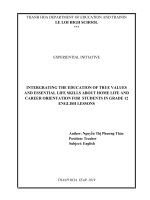job search and career checklists 101 proven time-saving checklists to
Bạn đang xem bản rút gọn của tài liệu. Xem và tải ngay bản đầy đủ của tài liệu tại đây (3.08 MB, 210 trang )
ArleneS. Hirsch
101 Proven Time-Saving Checklists to Organize and Plan Your Career Search
JOB SEARCH CAREER
A
N
D
CHECKLISTS
For job-seekers “on the go” who:
don’t have time to read longer career books
prefer quick and easy learning methods
want to be confident all job-hunting tasks are complete
are ready to find a new job tomorrow
like to use checklist format
TeAM
YYePG
Digitally signed by TeAM YYePG
DN: cn=TeAM YYePG, c=US,
o=TeAM YYePG, ou=TeAM
YYePG, email=
Reason: I attest to the accuracy
and integrity of this document
Date: 2005.08.03 19:11:03
+08'00'
By Arlene S. Hirsch
frontmatter_.qxp 12/1/2004 9:48 AM Page i
Job Search and Career Checklists
101 Proven Time-Saving Checklists to Organize and Plan Your Career Search
© 2005 by Arlene S. Hirsch
Published by JIST Works, an imprint of JIST Publishing, Inc.
8902 Otis Avenue
Indianapolis, IN 46216-1033
Phone: 1-800-648-JIST Fax: 1-800-JIST-FAX
E-mail: Web site: www.jist.com
About career materials published by JIST: Our materials encourage people to be self-directed and to
take control of their destinies. We work hard to provide excellent content, solid advice, and techniques that get
results. If you have questions about this book or other JIST products, call 1-800-648-JIST or visit www.jist.com.
Quantity discounts are available for JIST products. Please call 1-800-648-JIST or visit www.jist.com
for a free catalog and more information.
Visit www.jist.com for information on JIST, free job search information, book excerpts, and ordering informa-
tion on our many products. For free information on 14,000 job titles, visit www.careeroink.com.
Also by Arlene S. Hirsch: How to Be Happy at Work
Acquisitions Editor: Randy Haubner
Development Editor: Stephanie Koutek
Cover Designer: Trudy Coler
Interior Designer: Aleata Howard
Interior Layout: Carolyn J. Newland
Proofreader: Linda Seifert
Indexer: Henthorne House
Printed in Canada
08 07 06 05 04 9 8 7 6 5 4 3 2 1
Library of Congress Cataloging-in-Publication Data
Hirsch, Arlene S., 1951-
Job search and career checklists : 101 proven time-saving checklists to
organize and plan your career search / y Arlene S. Hirsch.
p. cm.
Rev. ed. of: VGM's careers checklists. c1991.
Includes index.
ISBN 1-59357-118-6 (alk. paper)
1. Vocational guidance Handbooks, manuals, etc. 2. Job hunting Handbooks,
manuals, etc. 3. Career development Handbooks, manuals, etc. I. Title.
HF5381.H517 2005
650.14 dc22 2004025534
All rights reserved. No part of this book may be reproduced in any form or by any means, or stored in a database or retrieval system,
without prior permission of the publisher except in the case of brief quotations embodied in articles or reviews. Making copies of any
part of this book for any purpose other than your own personal use is a violation of United States copyright laws. For permission
requests, please contact the Copyright Clearance Center at www.copyright.com or (978) 750-8400.
We have been careful to provide accurate information throughout this book, but it is possible that errors and omissions have been
introduced. Please consider this in making any career plans or other important decisions. Trust your own judgment above all else and
in all things.
Trademarks: All brand names and product names used in this book are trade names, service marks, trademarks, or registered trade-
marks of their respective owners.
ISBN 1-59357-118-6
frontmatter_.qxp 12/1/2004 9:48 AM Page ii
About This Book
The job market is a place of staggering confusion and complexity that requires savvy
career decision-making and job hunting skills. This book has been created in check-
list format to help you identify and develop the skills that you need to be successful
in the job market.
This book is written for anyone who is involved in making a career choice, career
change, or job change. The checklists in this book can be used either as stand-alone
exercises or as a comprehensive career guidance manual. You can work through the
checklists on a step-by-step basis or go directly to those checklists that address your
specific needs and concerns.
The book is divided into five sections. The first section is designed to help you
chart a career path. It uses a variety of self-assessment exercises along with job
market exploration tools to help you
understand where fit you best in
the world of work.
frontmatter_.qxp 12/1/2004 9:48 AM Page iii
The second section is designed to help you write an effective resume and cover let-
ter. You can use these checklists to determine which format to use, learn how to
effectively present information about accomplishments and experience, and discover
other valuable resume tips. This section also provides extensive information about
how to write great cover letters that not only get read, but make employers sit up
and take notice.
The third section covers the essential components of a job search strategy: network-
ing, informational interviewing, direct marketing campaigns, Internet research, and
other valuable tools to create and implement a successful job search campaign.
In the fourth section, you will find lots of information about the interviewing
process: how to prepare for an interview, anticipate both typical and difficult ques-
tions, develop rapport, manage illegal queries, and negotiate salary and other forms
of compensation.
The final section addresses a number of critical career decisions: how and when
to leave a job, change careers, go back to school, or start a new business. Taken
together, these five sections should enable
you to decide upon and implement
effective changes in your work life.
frontmatter_.qxp 12/1/2004 9:48 AM Page iv
Dedication
To Ruby—
first father, first love.
Acknowledgments
I would like to thank Randy Haubner, Stephanie Koutek, and Acacia Martinez, my col-
leagues at JIST, for their guidance and support. Without them, this book would not have
been possible.
frontmatter_.qxp 12/1/2004 9:48 AM Page v
Table of Contents
SECTION 1: Key Skills in Career Planning and Decision-Making 1
1. The Ten Commandments of Career Satisfaction and Success 2
2. Seven Rules for a More Successful Career 3
3. Knowing What You Do Best 5
4. How Motivated Are Your Skills? 11
5. What Do You Like to Do? The Power of Interests 13
6. A Second Look at Your Interests 14
7. 25 Work-Related Values 16
8. Personality Type 17
9. Working Conditions 18
10. Some Things You Need to Know About Career Testing 19
11. Choosing the Right Test 21
12. Brainstorming for Job Ideas 22
13. Researching the Job Market Through Informational Interviewing 32
14. Questions to Ask in Informational Interviews 34
15. Informational Interviewing Worksheet 36
16. Tapping into the Internet for Occupational Information 37
SECTION 2: Resumes and Cover Letters 39
17. Building Blocks of a Good (Chronological) Resume 40
18. Your Resume in Action: Verb(alizing) Your Accomplishments 42
19. One Size Does Not Fit All: Choosing the Best Resume Format 44
20. The Brave New World of Electronic Resumes 46
21. From Good to Great: Making Your Resume Stand Out 47
frontmatter_.qxp 12/1/2004 9:48 AM Page vi
22. Putting Your Education to Work 49
23. Sample Profiles 50
24. Keywords Are Winning Words 52
25. What Can You Do for Us? The Power of Accomplishments 56
26. Sample Resumes 58
27. Resume Planner 70
28. Cover Letters: Why You Need Them 74
29. How to Wreck a Cover Letter 75
30. Rules of the Cover-Letter-Writing Road 76
31. Cover Letter Greatness 78
32. Cover Letter Worksheet 79
33. Sample Cover Letters 80
34. Cover Letter Template 83
SECTION 3: A-Job-Hunting We Will Go 85
35. Testing Your Readiness IQ 86
36. Job Hunting While Still Employed 88
37. Seven Job Search Myths 90
38. Company Research 92
39. How to Recover from Involuntary Terminations 94
40. The Psychological Challenge 95
41. Where the Jobs Are 97
42. Help Wanted 99
43. Is Anybody Home? 100
44. Taking Advantage of Career Fairs 101
45. The Recruiter Connection 102
46. Recruiter Worksheet 104
© JIST WORKS
vii
__________________________________________________________________________________CONTENTS
frontmatter_.qxp 12/1/2004 9:48 AM Page vii
47. Can an Employment Agency Help You? 105
48. Employment Agency Worksheet 106
49. More Job Search Myths 107
50. Networking Strategies for Success 109
51. Network in Action 110
52. Eight Ways to Manage the Reference Process 118
53. Job Search Insanity 120
54. Do You Need a Career Counselor? 122
55. What Career Counselors Do 124
56. Finding the Right Counselor for You 125
57. Long-Distance Job Hunting 127
58. Working Globally 129
59. Managing Your Finances During a Job Search 130
60. Time Management for Job Hunters 132
61. Job Search Checklist 134
62. Secrets of a Successful Job Search 136
SECTION 4: The Interview 137
63. Interviewing: What Employers Look For 138
64. The Art and Skill of Preparation 140
65. Body English 142
66. Interview Do’s and Don’ts 143
67. Listening Skills 101 145
68. Expecting the Unexpected 146
69. “Food, Glorious Food” and Other Challenges of Mealtime Interviews 148
70. Typical Questions 149
71. “Tell Me About Yourself.” 151
© JIST WORKS
viii
JOB SEARCH AND CAREER CHECKLISTS ______________________________________________________________
frontmatter_.qxp 12/1/2004 9:48 AM Page viii
72. “Where Do You Want to Be Five Years from Now?” 152
73. The 25 Most Popular Behavioral Questions 153
74. Strategies for Dealing with Behavioral Questions 155
75. The Consultative Selling Approach to Interviewing 156
76. Problem-Solving Questions 158
77. “What Are Your Weaknesses?” 159
78. Red Flags: Dealing with Employer Objections 160
79. Overcoming Objections 162
80. Know Your Rights 163
81. Handling Illegal Questions 164
82. Your Turn to Ask 165
83. Closing Moves 167
84. The Global Factor: Interviewing with Foreign Companies 168
85. Salary Negotiations 170
86. Evaluating Job Offers 172
87. Say Goodbye to Your Job 173
88. The Counteroffer 175
SECTION 5: Career Development Across the Life Span 177
89. Career Planning: Taking the Time to Do It Right 178
90. What Do You Want to Be Now That You’re Grown Up? 180
91. Is a Career Change Right for You? 181
92. Taking a Professional Survey 182
93. Going Back to School (At Any Age) 183
94. Planning Your Career Change Strategy 184
95. Job Search Strategies for Career Changers 186
96. The Self-Employment Option 187
© JIST WORKS
ix
__________________________________________________________________________________CONTENTS
frontmatter_.qxp 12/1/2004 9:48 AM Page ix
97. Building Greater Security 188
98. Evaluating Your Job Security 190
99. Quitting Your Job Cold Turkey 191
100. The Downside of Downsizing 192
101. Your Career Progress Report 193
Index 194
© JIST WORKS
x
JOB SEARCH AND CAREER CHECKLISTS ______________________________________________________________
frontmatter_.qxp 12/1/2004 9:48 AM Page x
SECTION 1
Key Skills in
Career Planning
and Decision-Making
The goal of Section 1 is to help you figure out who you are and
where you fit in the world of work. In this section, you will find
a number of checklists to help you with the process of self-
assessment and job market research.
section 1_.qxp 12/1/2004 10:12 AM Page 1
© JIST WORKS
2
JOB SEARCH AND CAREER CHECKLISTS ____________________________________________________________
1. The Ten Commandments of Career
Satisfaction and Success
There is a wisdom of the head, and . . . a wisdom of the heart.
Charles Dickens
1. Honor your talents, interests, and values.
2. Choose a career that matters to you.
3. Build more competence every day.
4. Learn from your mistakes.
5. Seek out mentors whom you respect and admire.
6. Be an individual performer and a team player.
7. Strive for visibility.
8. Accept responsibility for your successes and your failures.
9. Keep things in balance and perspective.
10. Cultivate a supportive network of people for the good times and the bad.
section 1_.qxp 12/1/2004 10:12 AM Page 2
2. Seven Rules for a More
Successful Career
The future belongs to those who believe in the beauty of their dreams.
Eleanor Roosevelt
Rule 1: Motivation is the key to success.
The key to understanding personal motivation is in knowing what energizes you—
what kinds of activities, people, places, and situations are personally stimulating and
fulfilling—and then capitalizing on those motivations.
Rule 2: Success takes hard work.
Success takes preparation and hard work. Thomas Edison once remarked, “A genius is
a talented person who does his homework.” Bill Gates was a computer geek before he
was catapulted into the limelight. Michael Jordan was a hardworking and determined
high-school and college athlete before he became one of the greatest athletes of all time.
These men are rich, but they devoted themselves to their work, have been willing to work
hard, and haven’t been daunted by failure.
Rule 3: Learn from your mistakes.
Success depends on learning from mistakes and overcoming challenges.
It’s not enough to be ambitious. The world is filled with ambition, and the path to suc-
cess is littered with discarded dreams and disillusioned people who never achieved the
recognition or success they felt they deserved.
Rule 4: Follow your dreams.
Missions are the values or dreams that drive super-achievers to pursue excellence.
Clinical psychologist Charles Garfield researched super-achievers in business to learn
what made them different. In his book Peak Performers (Avon, 1991), he reveals that
these executives achieve consistently impressive and satisfying results without burning out
because “they went and pursued their dreams.” In every peak performer, Dr. Garfield
found a desire to excel at something the person truly cared about.
© JIST WORKS
3
__________________________________________SECTION 1: KEY SKILLS IN CAREER PLANNING AND DECISION-MAKING
section 1_.qxp 12/1/2004 10:12 AM Page 3
Rule 5: Honor your talents.
When Harvard University psychologist Howard Gardner conducted his landmark
research on multiple intelligences, he opened the door to a fuller understanding of human
potential. In contrast to society’s traditional emphasis on verbal and analytical abilities as
the pinnacle of intelligence, Dr. Gardner put forth a more expanded vision that includes
linguistic, musical, spatial, kinesthetic, emotional, interpersonal, and intrapersonal intelli-
gences. Understanding yourself as a multifaceted individual with many talents and possi-
bilities enables you to expand your vision of your own career potential.
Rule 6: Manage yourself.
There’s no direct correlation between success and mental health. You don’t have to be
a nice person to be successful. You can win the rat race and still be a rat. But if you
manage yourself well, you can win the rat race without turning into a rat. This involves
developing a good working relationship with your thoughts, feelings, and actions.
Rule 7: Take calculated risks.
Most of us were raised with rules and know the consequences of disobeying them. But
if those rules have taught you that it’s dangerous to take risks, you are limiting your
rewards. When building a career in the competitive work world, you must be willing to
take risks to reap the rewards you seek. Successful risk-taking involves knowing your risk
tolerance. What many otherwise ambitious careerists fail to realize is that not taking a
risk is also a risk. There’s a risk involved in not trying, and along with the risk of failing,
there’s the risk of regret.
© JIST WORKS
4
JOB SEARCH AND CAREER CHECKLISTS ____________________________________________________________
section 1_.qxp 12/1/2004 10:12 AM Page 4
3. Knowing What You Do Best
What lies behind us and what lies before us are tiny matters
compared to what lies within us.
Ralph Waldo Emerson
To determine your best career choices, you must be able to identify and build on your
skills and abilities. In the following checklist, I ask you to give more thought to those
dimensions of yourself. Rate yourself Excellent, Good, or Fair on each skill and then
choose your top ten skills in each area.
SKILLS WORKING WITH PEOPLE
Skill Rating (Excellent, Good, Fair)
Acting
Advising
Advocacy
Arbitration
Clarifying
Client/customer relations
Coaching
Collaborating
Communicating
Conflict management
Consulting
Counseling
Creating synergies
Debating
Decision-making
© JIST WORKS
5
__________________________________________SECTION 1: KEY SKILLS IN CAREER PLANNING AND DECISION-MAKING
(continued)
section 1_.qxp 12/1/2004 10:12 AM Page 5
© JIST WORKS
6
JOB SEARCH AND CAREER CHECKLISTS ____________________________________________________________
SKILLS WORKING WITH PEOPLE
Skill Rating (Excellent, Good, Fair)
Delegating
Demonstrating
Developing people
Diplomacy/tact
Directing
Effecting change
Entertaining
Facilitating
Helping others
Hosting
Influencing
Initiating
Instructing
Interrogating
Interviewing
Leadership
Listening
Litigation
Managing people
Mediation
Mentoring
Monitoring
Motivating
Negotiation
Nurturing
Performing
(continued)
section 1_.qxp 12/1/2004 10:12 AM Page 6
SKILLS WORKING WITH PEOPLE
Skill Rating (Excellent, Good, Fair)
Placating
Policing
Promoting
Public speaking
Recruiting
Representing
Sales
Socializing
Supervising
Teaching
Team-building
Training
Summary of Top Ten People Skills
1. ______________________________________________________________
2. ______________________________________________________________
3. ______________________________________________________________
4. ______________________________________________________________
5. ______________________________________________________________
6. ______________________________________________________________
7. ______________________________________________________________
8. ______________________________________________________________
9. ______________________________________________________________
10. ______________________________________________________________
© JIST WORKS
7
__________________________________________SECTION 1: KEY SKILLS IN CAREER PLANNING AND DECISION-MAKING
section 1_.qxp 12/1/2004 10:12 AM Page 7
© JIST WORKS
8
JOB SEARCH AND CAREER CHECKLISTS ____________________________________________________________
SKILLS WORKING WITH DATA AND THINGS
Skill Rating (Excellent, Good, Fair)
Accounting
Analyzing
Appraising
Assessing
Auditing
Bookkeeping
Budgeting
Calculating
Cataloguing
Charting
Classifying
Compiling data
Computer programming
Conceptualizing
Creating
Designing
Drafting
Drawing
Driving
Editing
Evaluating
Experimenting
Financial planning
Fund-raising
Forecasting
Formulating policy
Hypothesizing
Interpreting
section 1_.qxp 12/1/2004 10:12 AM Page 8
SKILLS WORKING WITH DATA AND THINGS
Skill Rating (Excellent, Good, Fair)
Inventing
Investing
Machine operation
Mechanical aptitude
Planning
Policy analysis
Policy development
Problem analysis
Problem-solving
Program design
Program development
Project design
Project development
Project management
Reading blueprints
Reducing costs
Regulating
Reorganizing
Researching
Reviewing
Scheduling
Spatial relations
Surveying
System analysis
System design
Testing
Troubleshooting
Typing
Using tools
© JIST WORKS
9
__________________________________________SECTION 1: KEY SKILLS IN CAREER PLANNING AND DECISION-MAKING
section 1_.qxp 12/1/2004 10:12 AM Page 9
Summary of Top Ten Skills with Data and Things
1. ______________________________________________________________
2. ______________________________________________________________
3. ______________________________________________________________
4. ______________________________________________________________
5. ______________________________________________________________
6. ______________________________________________________________
7. ______________________________________________________________
8. ______________________________________________________________
9. ______________________________________________________________
10. ______________________________________________________________
© JIST WORKS
10
JOB SEARCH AND CAREER CHECKLISTS ____________________________________________________________
section 1_.qxp 12/1/2004 10:12 AM Page 10
4. How Motivated Are Your Skills?
Nothing great was ever achieved without enthusiasm.
Ralph Waldo Emerson
During the course of your career, you may have developed lots of skills and abilities that
you prefer not to continue to use. When evaluating future career choices and options, you
want to be sure to capitalize on the use of what we call motivated skills. Just as the term
implies, motivated skills are the ones that you find energizing and enjoyable.
Review the exercise from Checklist 3 to determine which skills you really enjoy using and
want to continue to use and develop. List your motivated skills below. If you would like
to continue to enhance these skills, you can set learning goals for yourself that will enable
you to become increasingly proficient at things you enjoy.
Motivated Skills Working with People
1. ______________________________________________________________
2. ______________________________________________________________
3. ______________________________________________________________
4. ______________________________________________________________
5. ______________________________________________________________
6. ______________________________________________________________
7. ______________________________________________________________
8. ______________________________________________________________
9. ______________________________________________________________
10. ______________________________________________________________
© JIST WORKS
11
__________________________________________SECTION 1: KEY SKILLS IN CAREER PLANNING AND DECISION-MAKING
section 1_.qxp 12/1/2004 10:12 AM Page 11
Motivated Skills Working with Data and Things
1. ______________________________________________________________
2. ______________________________________________________________
3. ______________________________________________________________
4. ______________________________________________________________
5. ______________________________________________________________
6. ______________________________________________________________
7. ______________________________________________________________
8. ______________________________________________________________
9. ______________________________________________________________
10. ______________________________________________________________
© JIST WORKS
12
JOB SEARCH AND CAREER CHECKLISTS ____________________________________________________________
section 1_.qxp 12/1/2004 10:12 AM Page 12
© JIST WORKS
13
__________________________________________SECTION 1: KEY SKILLS IN CAREER PLANNING AND DECISION-MAKING
5. What Do You Like to Do?
The Power of Interests
Do what you love, the money will follow.
Marsha Sinetar
Psychologist John Holland developed a well-known classification system that you can use
to organize your thinking about your interests. He believed that most people can catego-
rize their interests according to six types: Realistic, Investigative, Artistic, Social,
Enterprising, and Conventional.
A review of these categories may help you define your strongest areas of vocational inter-
est. Keep in mind that most jobs and occupations combine aspects of several interest cat-
egories instead of falling under the exclusive domain of any one category.
✔
Realistic: Individuals with realistic interests prefer activities that involve working
with tools, machinery, or animals. They often enjoy working with their hands and
being outdoors. Typical realistic jobs include engineers, machinists, and farmers.
✔
Investigative: Investigative people are usually analytical, methodical, precise,
and curious. They enjoy solving complex mathematical problems, scientific inquiry,
and research. Typical investigative careers include biologists, mathematicians,
research scientists, and physicians.
✔
Artistic: Artistic individuals are often creative, non-conforming, original, and
introspective. They tend to like flexible, unstructured environments that value
innovation and creativity. Typical occupations include artists, writers, designers,
and musicians.
✔
Social: People with social interests enjoy helping and teaching others. They are
often social workers, counselors, teachers, and bartenders.
✔
Enterprising: Enterprising individuals are often drawn to the business world. They
enjoy influencing, persuading, and leading others for the purpose of economic or org-
anizational gain. Salespeople, attorneys, and managers are often enterprising types.
✔
Conventional: People with conventional interests enjoy working with data and
paper. They are often drawn to jobs or professions with high levels of administrative
activities, such as accountants, secretaries, and administrators.
section 1_.qxp 12/1/2004 10:12 AM Page 13









